-
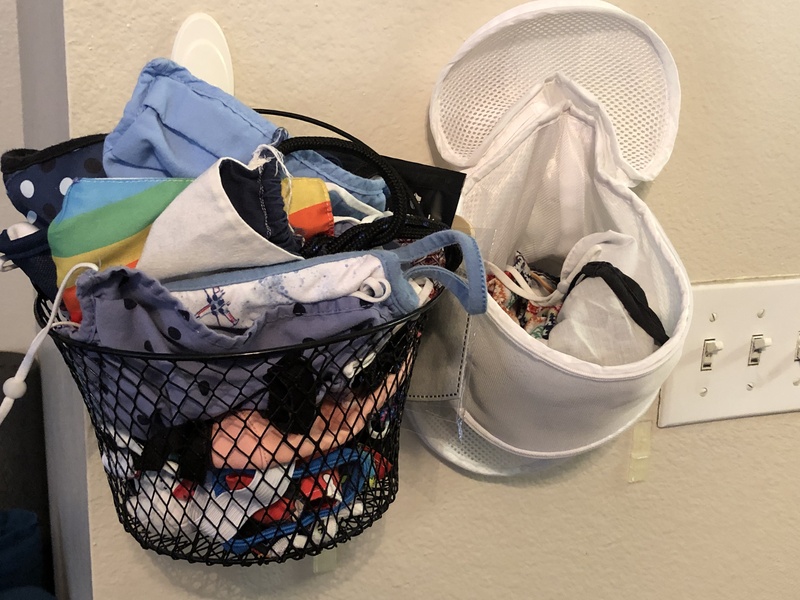
2021-02-27
Since the beginning of the pandemic, I wore a mask. I think I went one place without one on Friday, March 13, as the world fell apart and I was driving home to Phoenix from my mother’s house in San Diego County. But since then, I have been collecting masks the way I would collect graphic and band tees as a teenager and young adult. I have developed “criteria” for what I like, prefer, and even need in a mask. I think about it when I pick one each day. If I am wearing patterns, I grab a solid mask in a complementary color. Solid outfits open up the gates to lots of options.
Very quickly, I realized I needed a way to manage these masks. The two hooks that hang near our front door for stocking at Christmas promptly became something else. A bin of clean masks hangs on one hook and a lingerie bag on another. The routine is simple, grab a mask from the container as you leave, come home and drop it in the bag. When the bag is full, zip it up and drop it in the wash. Done!
So here are some of my favorites:
• Baby Yoda
• Disneyland Spirit Jersey style
• Old Navy, Old Navy, Old Navy – they come in five packs, available for every season and holiday, prints and solids, easy to grab, cannot say enough
• And, of course – the true hero of the pandemic, masks made with love. My coworkers and I have chosen the raccoon for our library mascot. My boss’ mom had this beaver fabric just sitting around, so she made one for each of us (bonus points, this one has a nose wire), and finally, the same wonderful ex-co-worker of our department who made us all the raccoon masks made school-themed ones for us, the Desert Vista Thunder, one with lightning bolts and one with the school colors in the plaid.
• Our other library theme is rainbows and all things equality – down to the matching rainbow Apple Watch bands we have to pair perfectly with this rainbow hearts mask from the Human Rights Campaign.
I am not ready to give up wearing masks. I have both doses of Pfizer, and it has been two weeks, but I still think masks are a good idea and something that I will for sure be wearing when I feel any kind of sick post-pandemic if that ever happens. It’s the responsible thing to do, and frankly, I have too much invested into my masks and management system to say goodbye to it anytime soon.
-
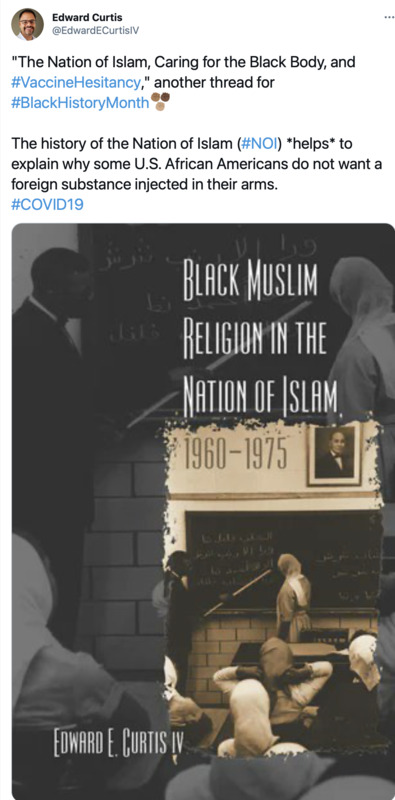
2021-02-16
The history of the Nation of Islam and its resistance to traditional American medical practices adds critical context to explain why some African Americans do not want to COVID vaccine.
-
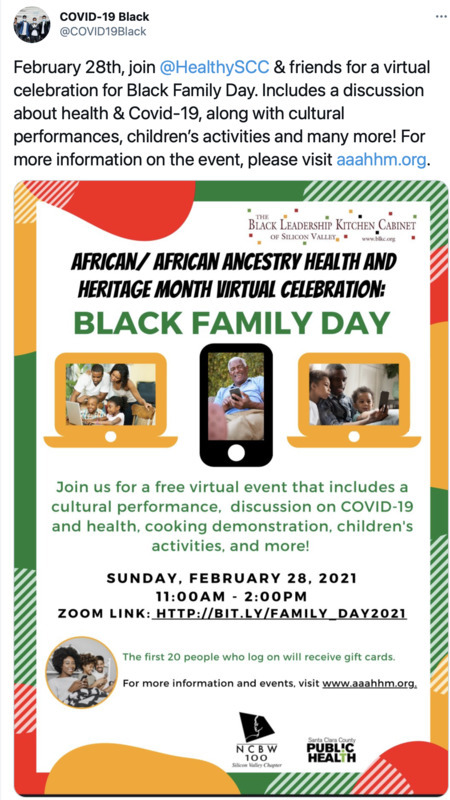
2021-02-22
Repost via Twitter @COVID19Black. Santa Clara County Public Health is hosting a virtual celebration for Black Family Day on Sunday, February 28, 2021 (11:00 AM- 2:00 PM) zoom link provided: http://BIT.LY/FAMILY_DAY2021
-
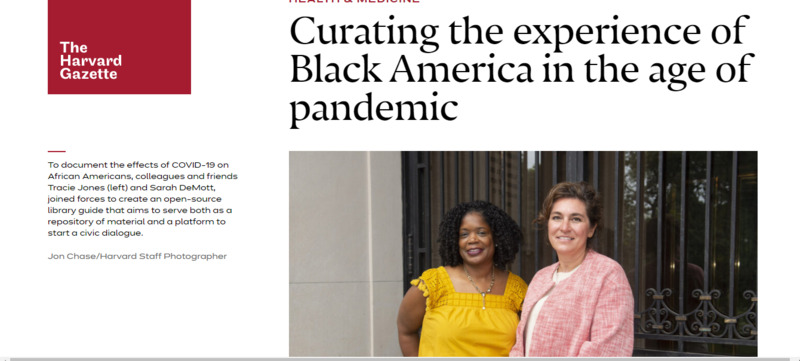
2020-09-10
This story, from the Harvard Gazette, features the work of two friends -Tracie Jones & Sarah DeMott- as they try to curate the experiences of black Americans during the coronavirus pandemic. Their collective effort resulted in Black America and COVID-19; a library guide that seeks to serve as a historical database for stories about the impact of the pandemic on African American communities. Information and material included in the database ranges from oral histories, podcasts, blogs, and links to webinars.
-
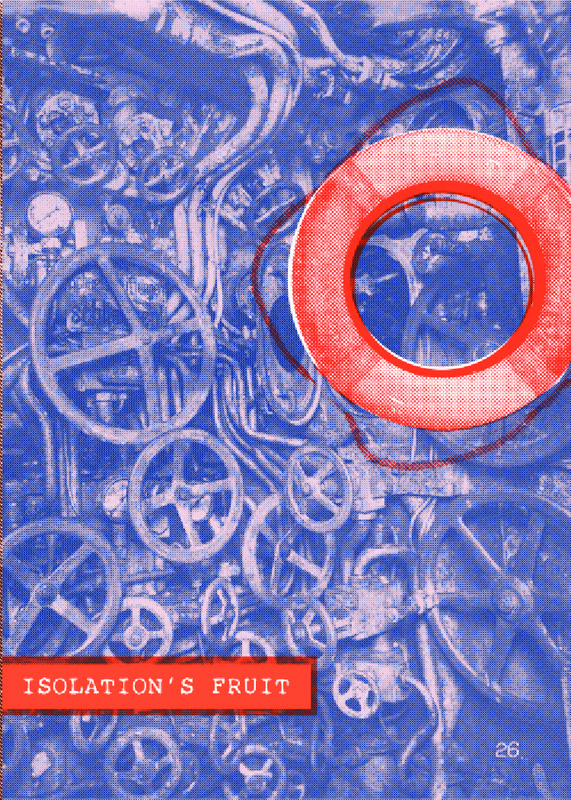
2020-12-13
Collaborative risograph art zine from ASU ART 394 Fall 2020 about Covid-19.
-
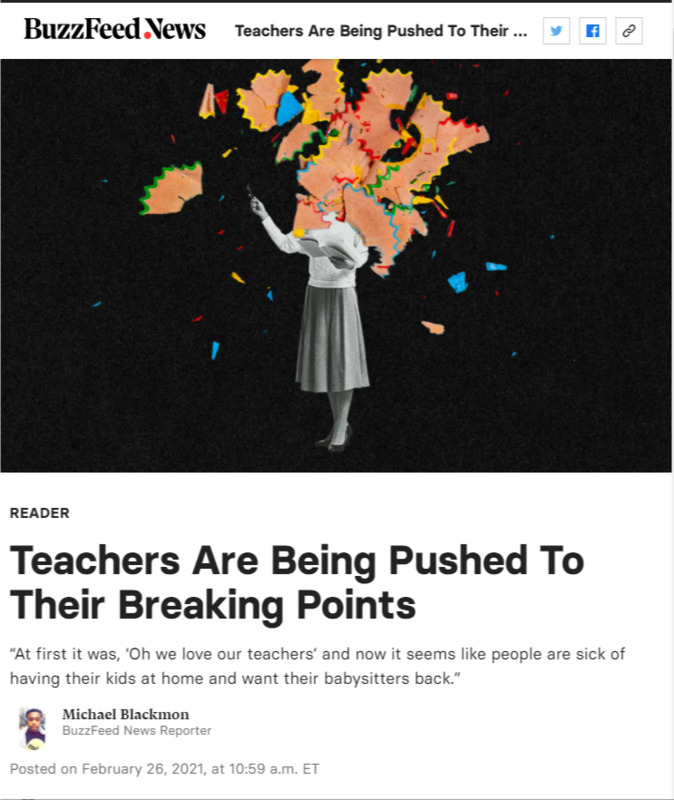
2021-01-26
From article: “At first it was, ‘Oh we love our teachers’ and now it seems like people are sick of having their kids at home and want their babysitters back.”
-
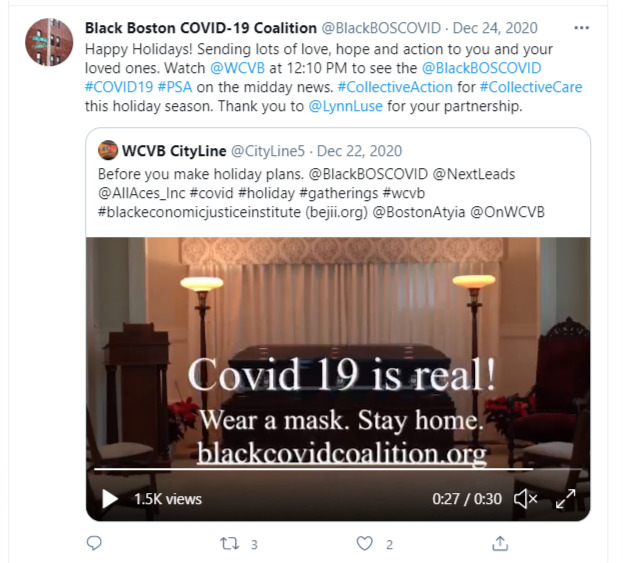
2021-02-26
This twitter post by the Black Boston COVID-19 Coalition features a video warning Boston's Black community not to gather with their families during the holiday season. It was also shown on television as a PSA announcement on a local news station. The video shows a family celebrating Christmas dinner with their grandmother, a group of children receiving gifts from their uncle, and a dining room decorated with lots of party decorations. These happy scenes are interrupted by the grandma vanishing (to represent her death from COVID), a child critically ill with COVID in the hospital, and a coffin sitting alone in a funeral home. These stark images are meant to remained the Black community of their vulnerability COVID deaths and encourage them to avoid meeting their families in an attempt to stop their community from getting COVID-19. This twitter post shows the self-activism of Black community by showing how it mobilized to create COVID warnings and resources to help their people be informed and to warn them of the dangers of becoming a source and recipient of the virus.
-
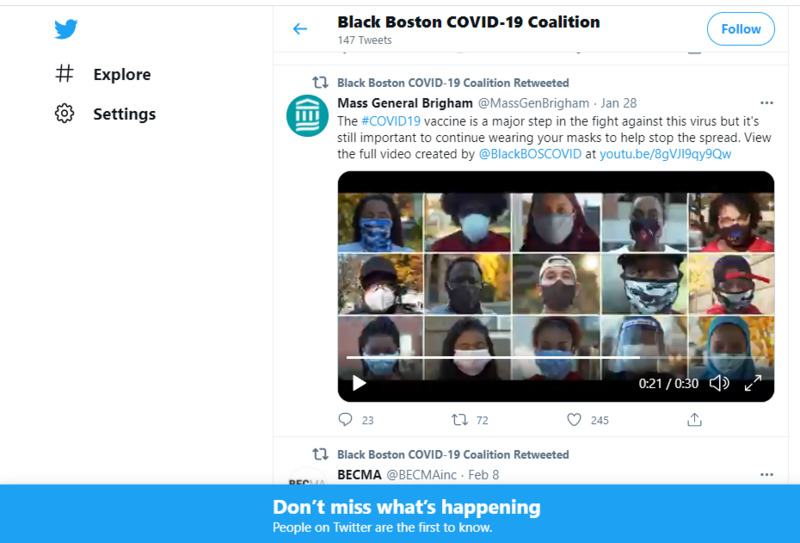
2021-02-26
This twitter post by the Black Boston COVID-19 Coalition features a video explaining (interestingly with some subjectivity) the importance of wearing masks for the Black community in Boston Mass. It briefly explains the successful triumphs the U.S. African American community has had in fighting for their quote "civil rights" and "lives" and that they now cannot allow quote "the air" to kill their people and destroy their communities. A topic that came up in one of our weekly meetings a few weeks ago was the impact of "shame" on the behavior of people. This is exemplified by the elderly woman who stares disapprovingly at the young man who did not wear his mask. The subjective impression conveyed is that you should wear your mask because it is a shameful disregard for human life if you do not. This twitter post shows the efforts of the Black Community of Boston to raise awareness of the importance of mask use and shows the care and concern of the Black Boston community for its members.
-
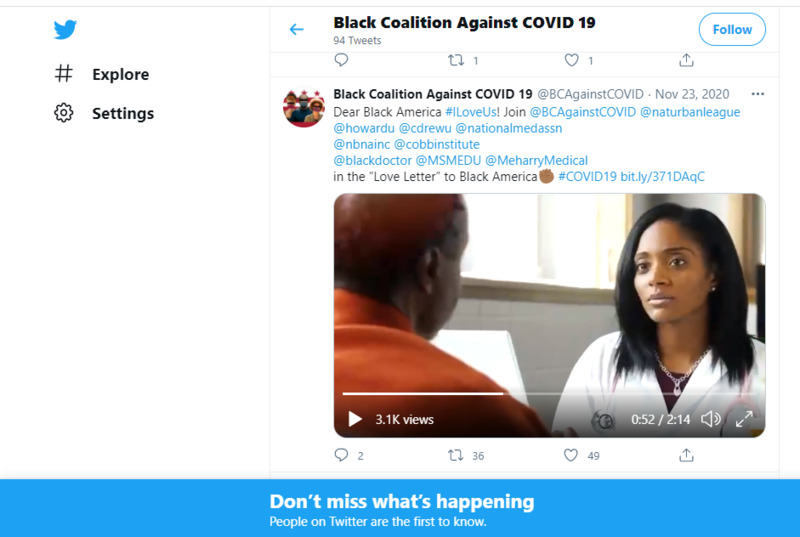
2021-02-26
This twitter post was featured on the Black Coalition Against COVID 19's twitter page. The video is a "Love Letter" to the United States black community and offers an affirming and reassuring statement of the African American medical and research community's commitment to the health, protection, and quote "survival" of their ethnicity. The video affirms that black medical staff will continue to fight for equality in healthcare while encouraging the black community to continue wearing masks, social distancing, avoiding holiday gatherings, and to participate in COVID-19 vaccine trials. The video is an uplifting example of the Black community's efforts to show their people that they will be heard, valued, protected and will overcome the virus.
-

2021-02-26
Health Canada has approved the Oxford University-AstraZeneca COVID-19 vaccine, estimating its effectiveness at preventing infection at 62.1%. This means there will now be three vaccines available against COVID-19, the others being Pfizer and Moderna.
-
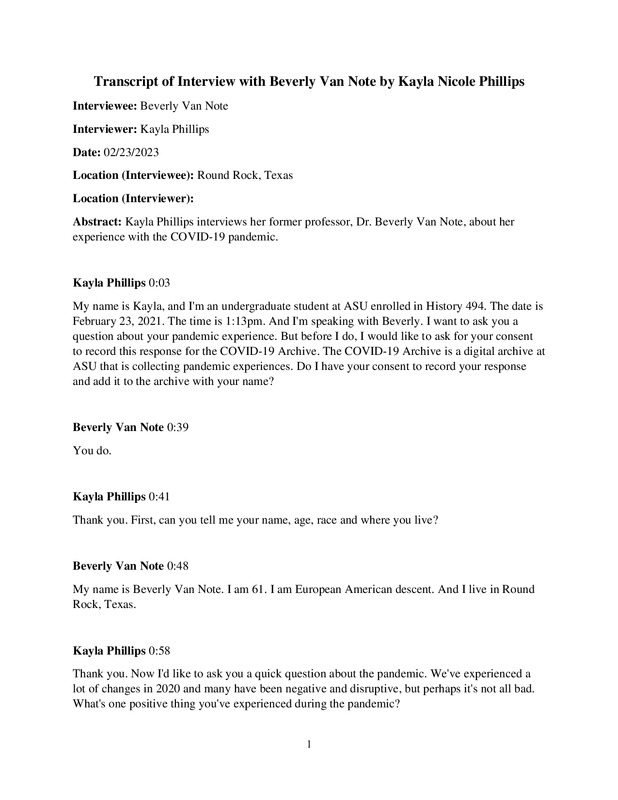
02/23/2021
I recorded a mini oral history with my former professor Dr. Beverly Van Note.
-
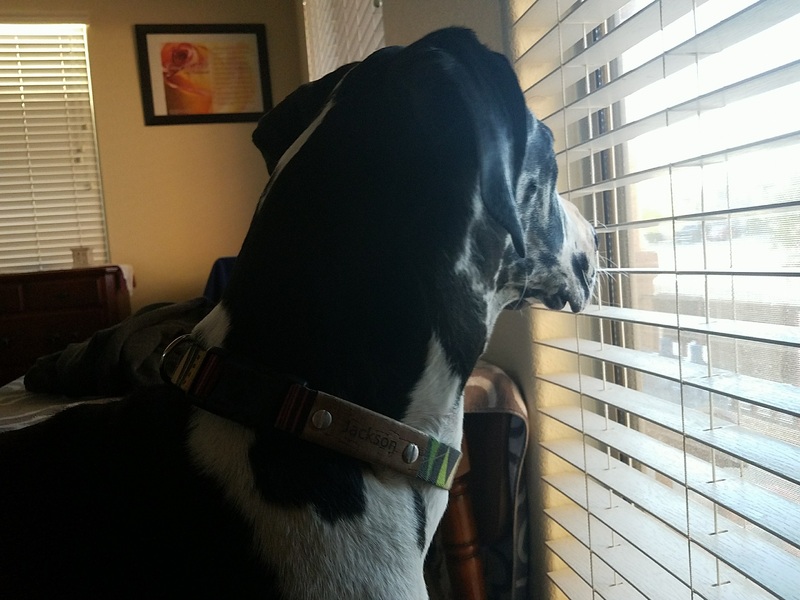
2021-02-25
Like people, my dog seems to miss going out to public spaces (like an out door mall, hiking, the patio of a restaurant, even the Pima Air and Space Museum) and getting attention from all the humans that pass by. He too is missing out on the social experiences that he used to enjoy before the pandemic.
-
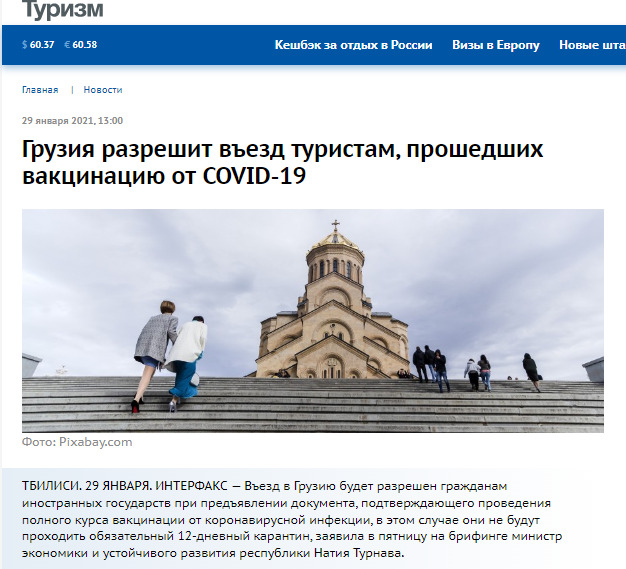
2021-03-01
It is an article that tells the story about lifted travel bans between Russia and Georgia.
-

2021-02-24
Because covid19 has had an extremely detrimental impact on many people's financial wellbeing, a momentary hiccup of the Federal Reserve has a lot more potential to do damage than in the pre-covid19 world.
-
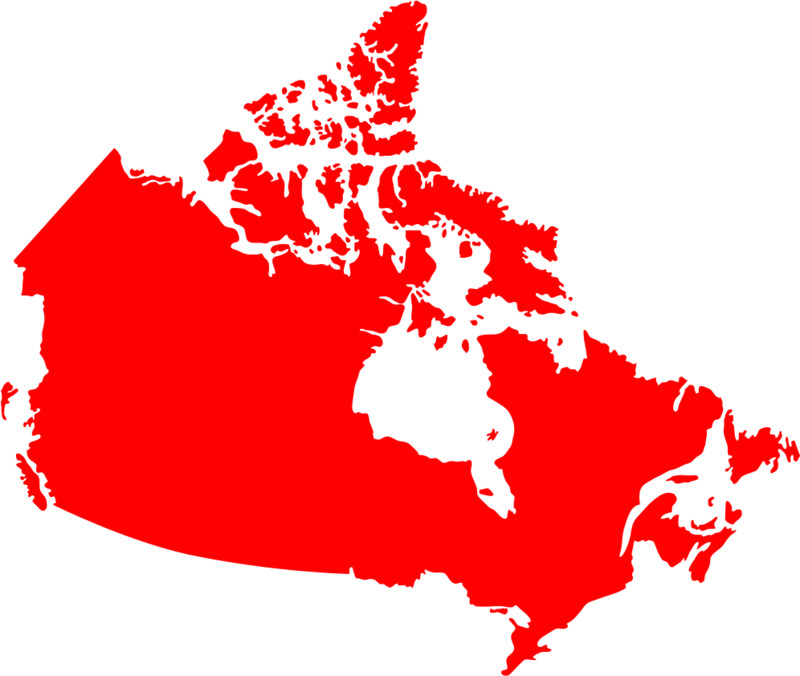
2021-02-24
This image has been uploaded to the archive for Dr. Kole for the Canada collection
-
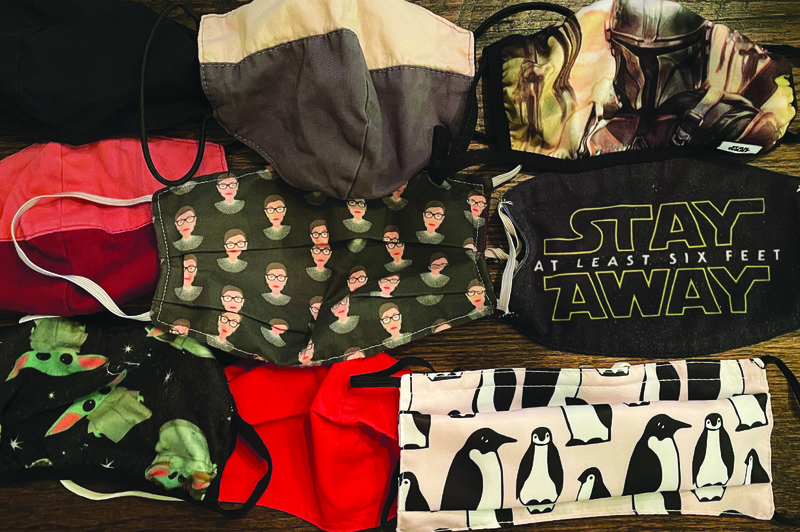
2021-02-24
Will we miss them when we no longer need them? What will become of these scrappy, sometimes brightly-colored statement pieces? In many ways, a mask has become the sartorial equivalent of a tie. Men still wear ties, but really…why? They serve no purpose. Will we do the same without masks? A mask can reveal who the wearer is in a way that a bare face cannot. Study the mudroom collection in this photo reveals and you will know that someone loves Star Wars and the other is a feminist who adores penguins.
After the Texas deep-freeze, and Ted Cruz’s air cruise to Mexico to escape the failure of the power grid, he returned to the U.S. hiding behind an enormous Lone-Star state face mask—as if donning it would make everyone forget his Marie-Antoinette moment. For future generations reading this: Cruz abandoned his constituents who were without power and water for days and flew to a Cancun resort with his family because they were cold. Did the mask hide his shame when he returned home after being caught? If so, maybe we should keep the mask in our wardrobes in our post-COVID futures. Perhaps the year of plague has given us a new fashion choice as well as a place to hide when necessary.
-
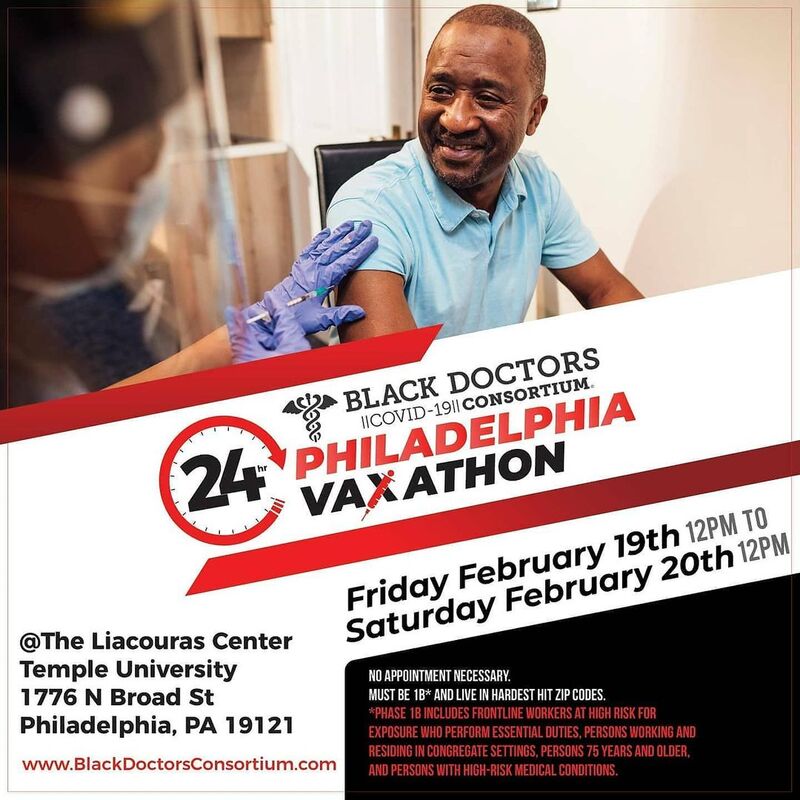
2021-02-18
The Black Doctors Consortium in Philadelphia, Pennsylvania planned to administer vaccines at the Liacouras Center at Temple University. It was to last 24 hours from Feb 19 12PM to Feb 20 12PM. It aimed to serve those who "live[d] in the hardest hit zip codes." No appointments were necessary. The original poster, handle @dralastanford, posted a series of photographs that helped answer some of the most frequently asked questions. These included the zip codes they were aiming for. These zip codes were specifically chosen as African Americans had "more than 50% of [the] death[s] related to COVID-19."
With so much confusion over the vaccine and how to get it, this organization tried to make it an easy process. They assured that there would be designated lines for those who pre-registered and those who didn't.
-

2021-02-19
The original poster updated their social media feed (Twitter), in the form of a thread, about the vaccination site at the Liacouras Center at Temple University in Philadelphia, Pennsylvania. The vaccines were administered by the Black Doctors COVID-19 Consortium (https://blackdoctorsconsortium.com/). The poster shared videos and photos of the people lining up to get their vaccines, which lasted hours.
Since the mission was to get people vaccinated, there were some who had pre-registered for it. Unfortunately, even some of those people still had to wait a long time. It's really saddening to see how everyone waiting had to wait in freezing weather, and it seems that if they left for food, the restroom, or otherwise, their spot would just be taken. As written in the last screenshot, there were thousands of doses still left to give at that point, and they weren't sure how long it would take to do so.
-
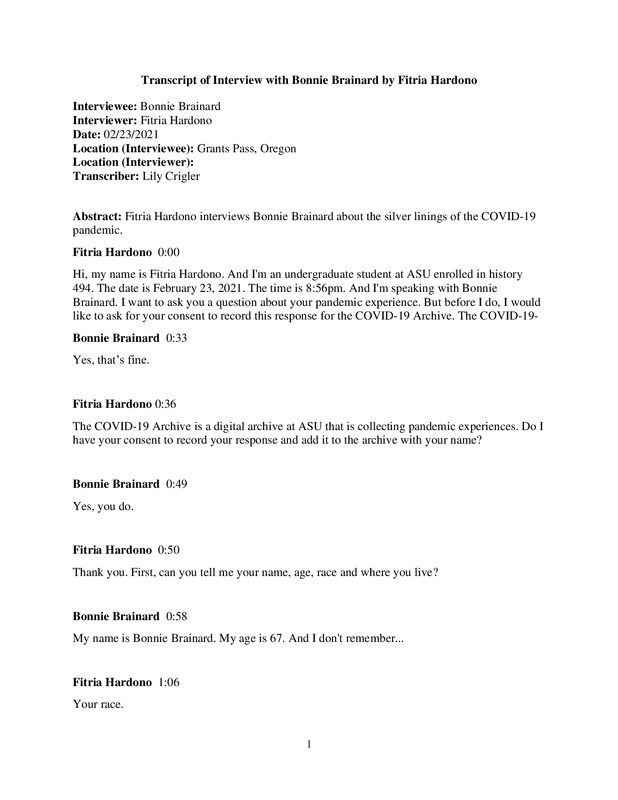
02/23/2021
I recorded a mini oral history with my former professor Dr. Beverly Van Note.
-
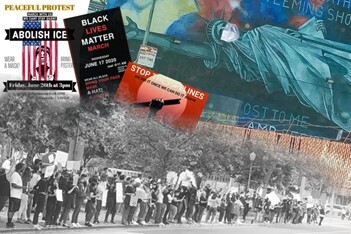
2020-02-23
The COVID-19 pandemic has not stopped millions of people around the world from taking to the streets and organizing collectively against oppression and racism. Advocates, protestors, leaders and supporters from all backgrounds and walks of life are fighting many fronts to establish lasting social change, despite the dangers and rising infection rates.
These are historical movements within a historical moment- how are you fighting for social justice during this pandemic? And how has the pandemic affected your fight for social justice? Your contribution to the archives will ensure these battles and their ideology are preserved for future generations.
Your stories are valuable, and we hope that you will share them. Share your story here. Your voice will be archived alongside other stories of resilience and social justice efforts.
To make your story more visible, include the hashtag #SocialJustice with your description. Questions? Email Dana Lee Bell for more information. The link to submit is https://covid-19archive.org/s/archive/page/Share
-
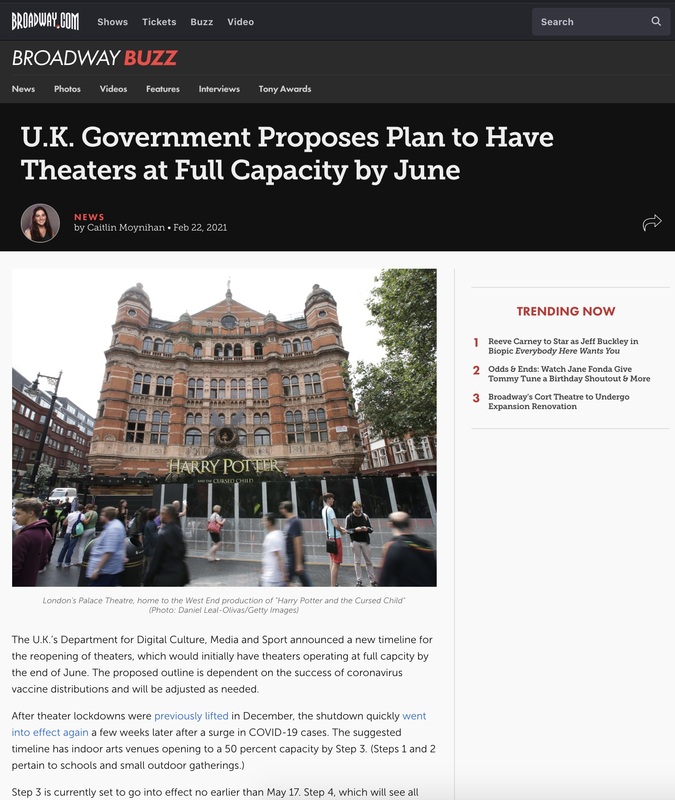
2021-02-22
This article discuses how theaters in the UK are already partially open and are expected to be at full capacity by June 2021. This is in contrast to Broadway, which is closed in any capacity until May. I feel like this shows how detrimental the United States' response to COVID-19 in 2020 was and how it set us behind the rest of the world in returning to normalcy.
-
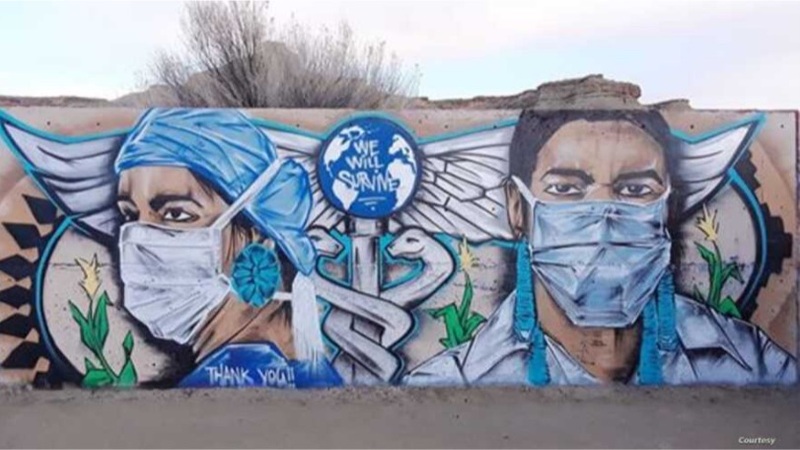
2020-04-04
This photo is included as part of an article about the Navajo Nation's fight against COVID-19.
-
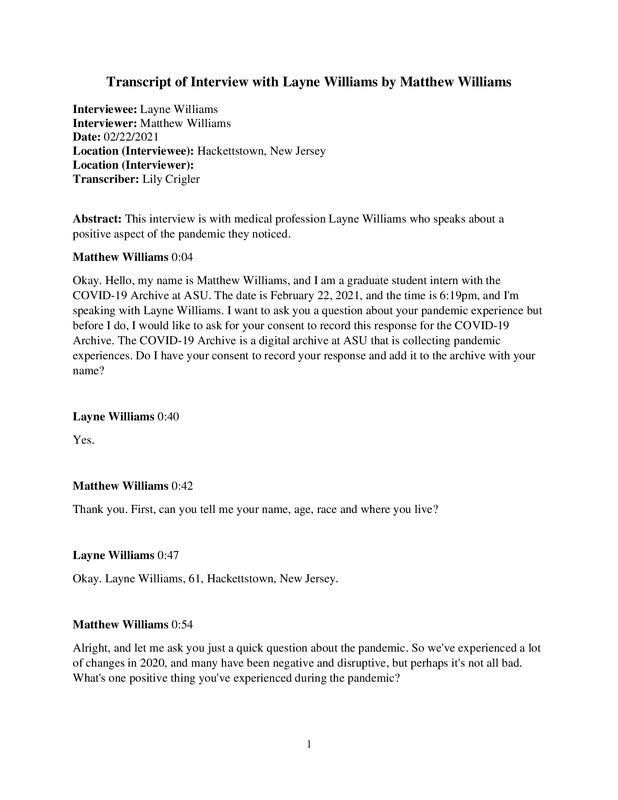
02/22/2021
This interview is with medical profession Layne Williams who speaks about a positive aspect of the pandemic they noticed.
-
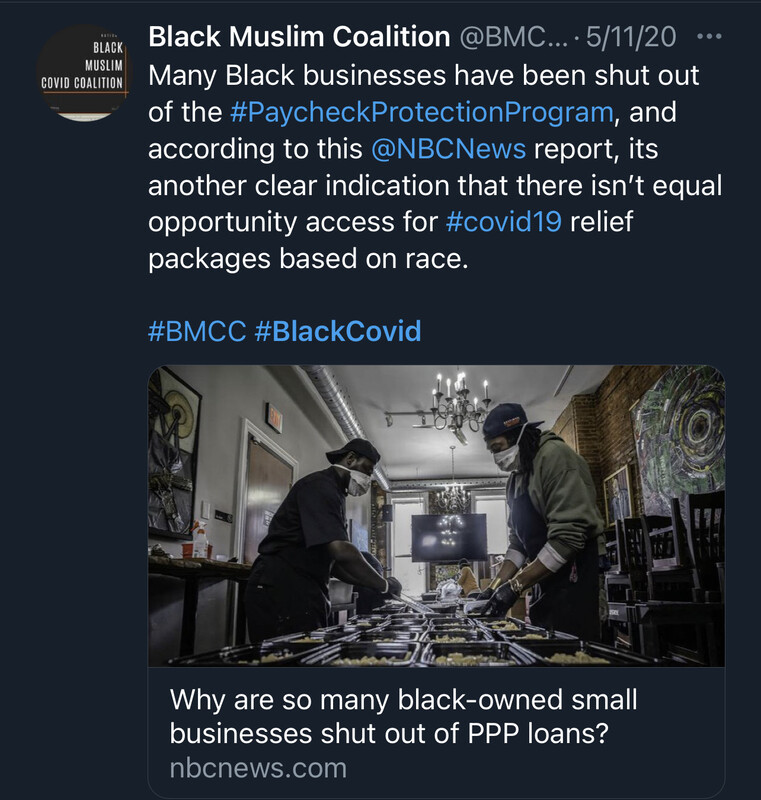
2021-02-22
Though 60 billion is kept aside by CARES act funding for minority and other underserved borrowers, black-owned businesses are having trouble accessing the government's emergency Paycheck Protection Program loans. The corona virus loan program set 10 million in loans per customers that could be turned in to grants depending on individual profiles. but since its launch much controversy developed as with in minutes funds ran out to well resourced companies. Baltimore cafe owner Terence Dickson reached out to every on he knows as he was on his on last couple hundred to keep the staff paid. He states that the " financial industry has shown me no love for 20 years". He believes that the system should be different. This shows how small black owned businesses have continued to struggle through the pandemic even though the availability of loans and grants are there; but its still unavailable to reach them .
-
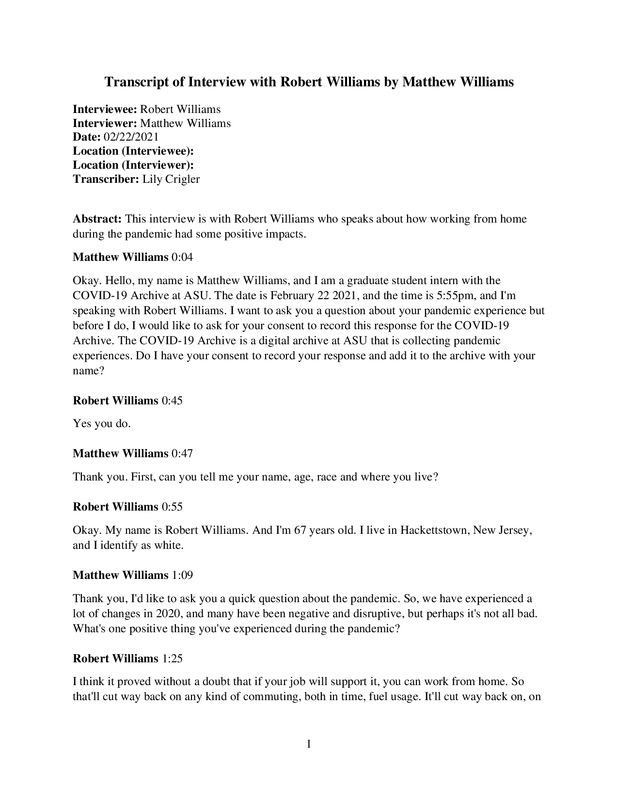
02/22/2021
This interview is with Robert Williams who speaks about how working from home during the pandemic had some positive impacts.
-
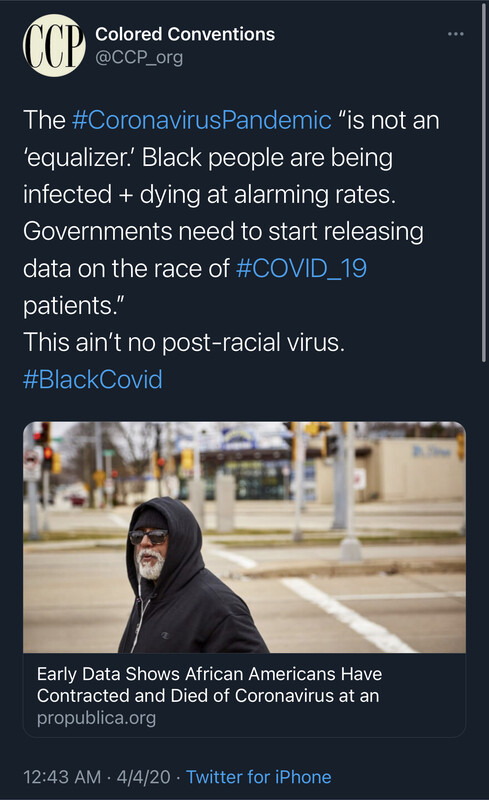
2021-02-22
This post shared on social media talks about how environmental, economic and political factors play key roles in the pandemic spread. Interestingly this article talks about the county Milwaukee, in which simply being black puts the life expectency down by 14 years. Dr. Camara Jones states in this article that "COVID is just unmasking the deep disinvestment in our communities, the historical injustices and the impact of residential segregation,”. As stated in the article, when mojority of black people in Milwaukee county went to near by hospitals when they felt they were in contact with the virus, they were sent home and died before the confirmation of the test came back. This shows how the pandemic is effecting black people.
-
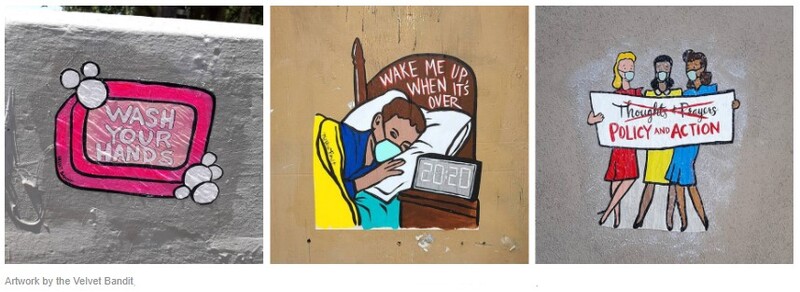
2021-02-22
Art unleashes, intensifies, and celebrates precisely the creative and destructive impact of vibratory force on bodies, on collectives, on the earth itself: it protects and enhances life that is and announces life to come.
-- Elizabeth Grosz,
Chaos, Territory, Art: Deleuze and the Framing of the Earth.
This call for submissions seeks to highlight street art in the Journal of the Plague Year (JOTPY), a Crowdsourced digital archive where anyone can add their experiences and responses to the global pandemic for future generations to witness.
Oftentimes, street art is temporary in nature and may be removed, obscured, or destroyed. Help JOTPY recognize the diversity of street artists and their expressions of the pandemic experience. Street art often reflects individuality, community sentiment, class differences, politics, emotion, and humor. Your contributions to the archive – such as news articles, blog posts, videos, photos, and social media posts of murals, graffiti, paste-ups, stencils, and stickers – will provide future generations access to a fleeting moment of art in and on public spaces and places during the pandemic.
When submitting a street art item to JOTPY, please include a title for your submission, a description and location of the street art, your name (names can be kept private/anonymous), and #pandemicstreetart. Text stories, image(s), video(s), audio, and PDF files are all accepted file types. If the street art speaks to your experience(s) of the pandemic, please share your thoughts!
If you would like to contribute, please share your story/pic/video here and reach out to Monica Ruth at meruth1@asu.edu if you have any questions.
-
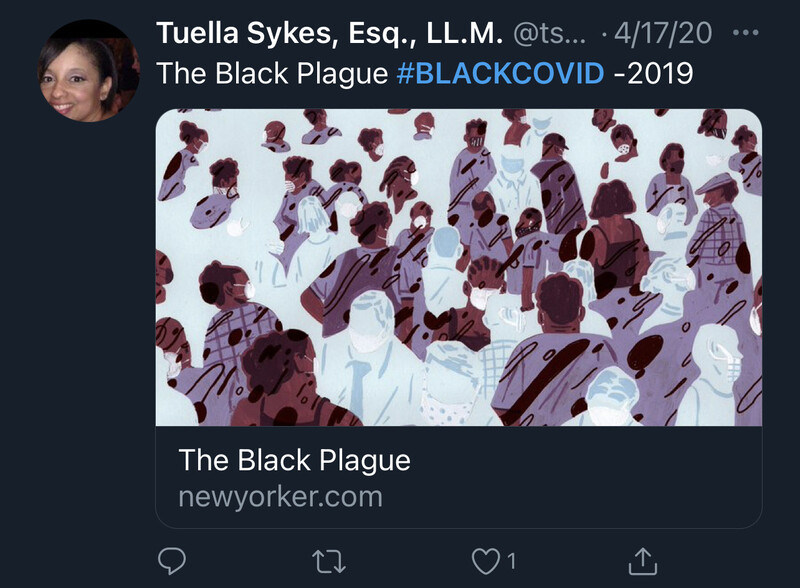
2021-02-22
This post tags an article titled "The Black Plague" which states that according to the Reuters report African Americans are more likely to die from Covid-19 than any other group in the U.S.. The article goes further in to explain the synopsis of affected and deaths of certain states but it importantly states that black people are more likely to have pre-existing health conditions that weaken their immune systems causing them to be easily infected. Though this is one reason why; other reasons including, as stated in the article "Trumpanian Malfeseance" is another major cause. With the testing locations around the U.S having major breakpoints, it was noted that zipcodes of higher-income families had the closest and many available sights of getting tested compared to zip codes with low-income families. Further studies showed that out of these lower-income locations, the majority was filled by black people. This limited the opportunity for black people to get tested and explains how the pandemic is affecting black people.
-
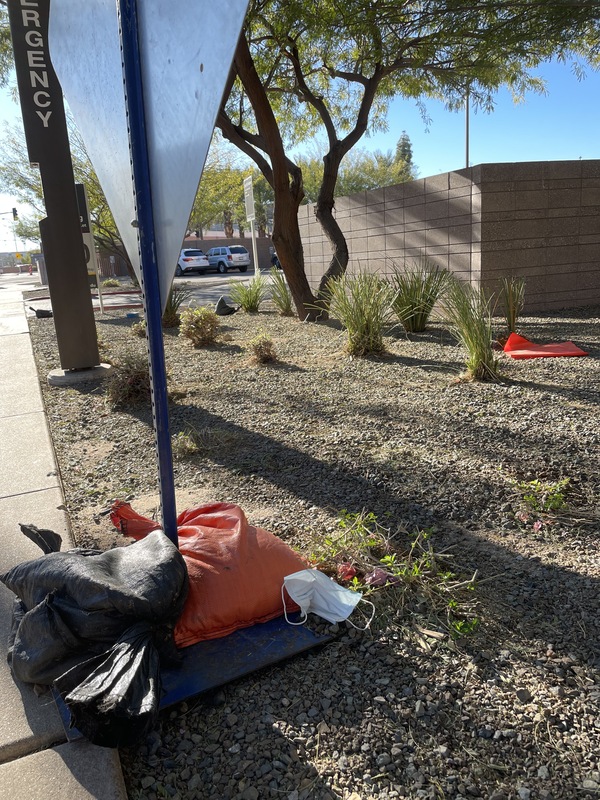
2021-02-22
Disposable mask spotted en route from the Tempe transit center to the Childhood Development (Psychology building) on Campus along Veteran's Way. 33°25'21.0"N 111°55'45.3"W
-
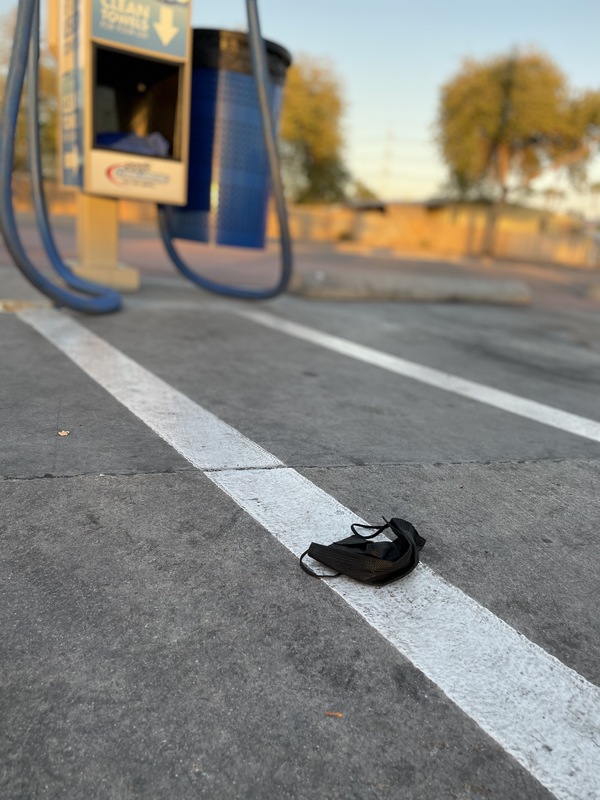
2021-02-20
I saw this black, disposable mask while vacuuming my van on Saturday at Cobblestone Auto Spa. I picked it up and threw it away before it blew into the water channel.
-
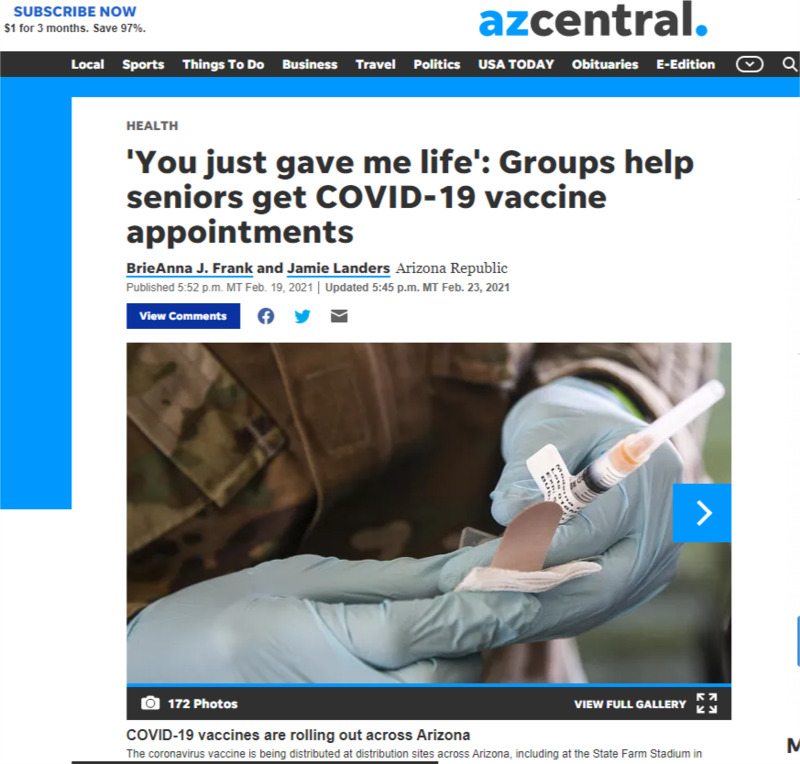
2021-02-19
The elderly of Arizona are having difficulty sign-up for a COVID-19 vaccine. Issues with the state website and difficulty accessing technology seem to be the main causes. The ADHS is working on making the website more functional and is using an appointment hotline to combat the issue. Local groups are also assisting the elderly with making appointments.
-
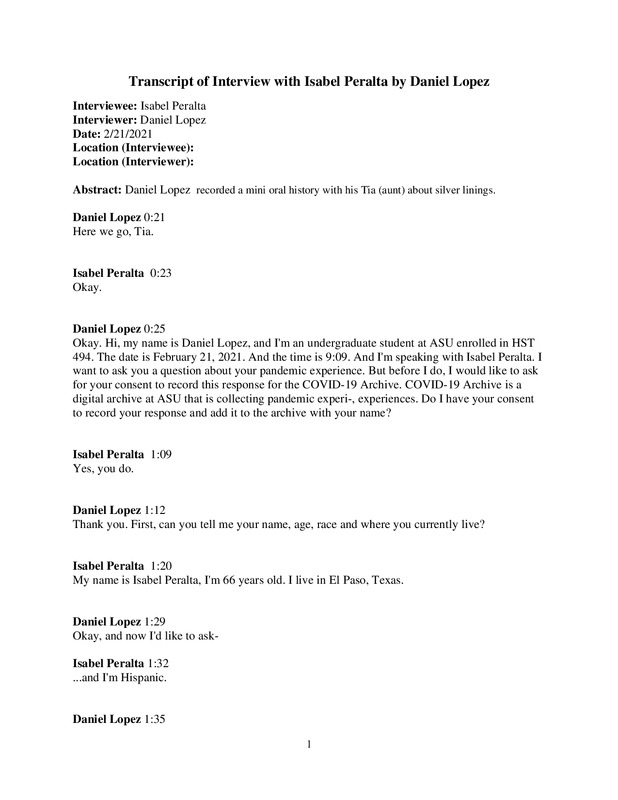
02/21/2021
I recorded a mini oral history with my Tia (aunt) about silver linings.
-
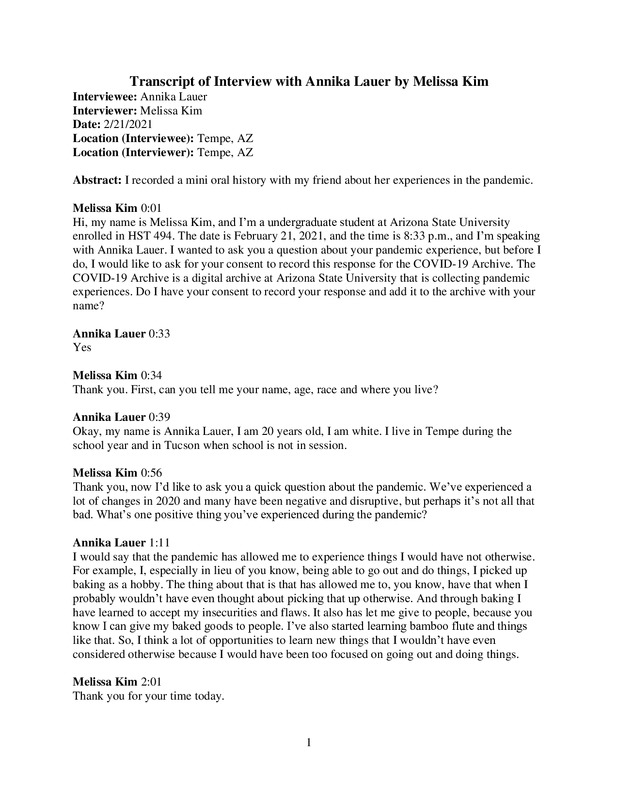
02/21/2021
I recorded a mini oral history with my friend about her pandemic experiences
-
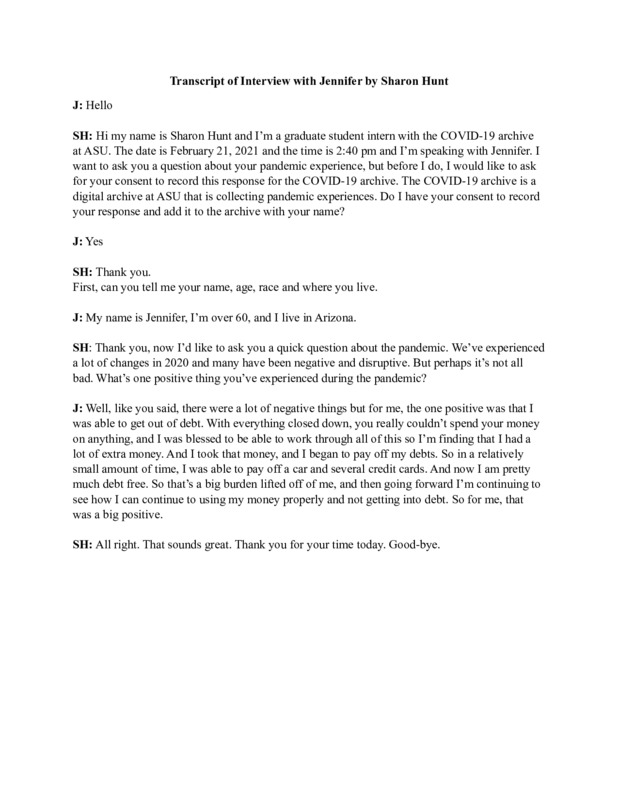
2021-02-21T14:40
Transcript of Interview with Jennifer by Sharon Hunt
Interviewee: Jennifer
Interviewer: Sharon Hunt
Date: 2/21/21
Location (Interviewee): Tucson, Arizona
Location (Interviewer): Tucson, Arizona
Transcriber: Sharon Hunt
Abstract:
Jennifer lives in Tucson, Arizona, and spoke about a positive result of the pandemic that she has experienced. She has been able to save money and pay off debts during this time period, as she has not been able to go out and shop or go to restaurants as she did in pre-pandemic times.
-
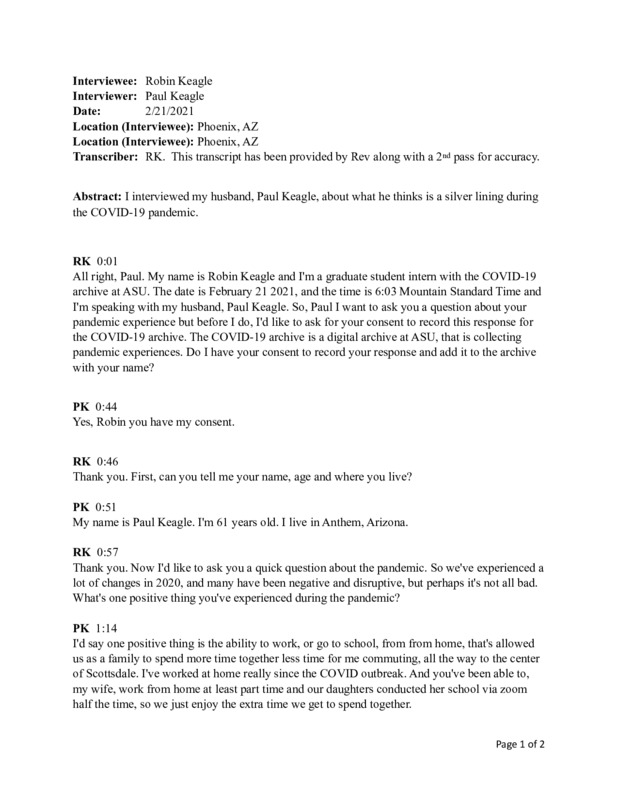
02/21/2021
This is a mini oral history with my husband, Paul Keagle, regarding silver linings during the pandemic.
-
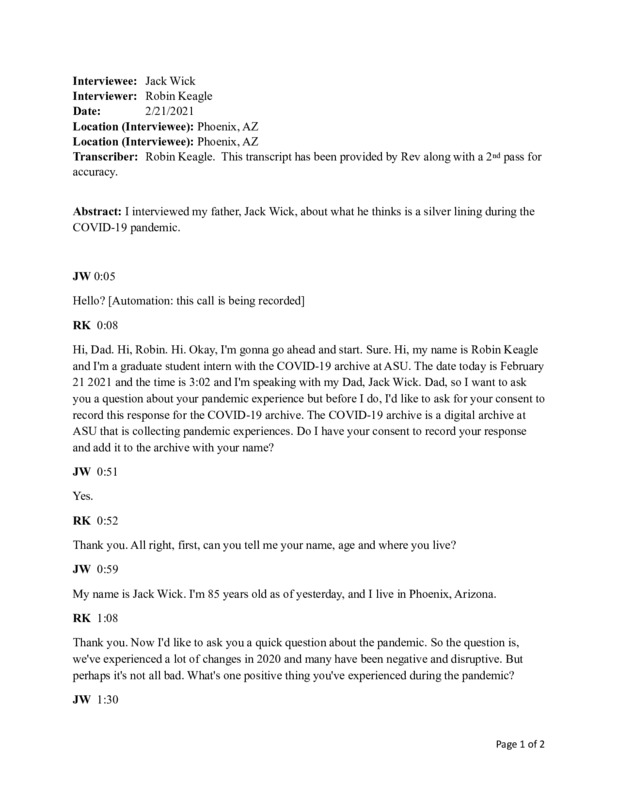
02/21/2021
This is a mini oral history interview with my father, Jack Wick, regarding silver linings during the pandemic.
-
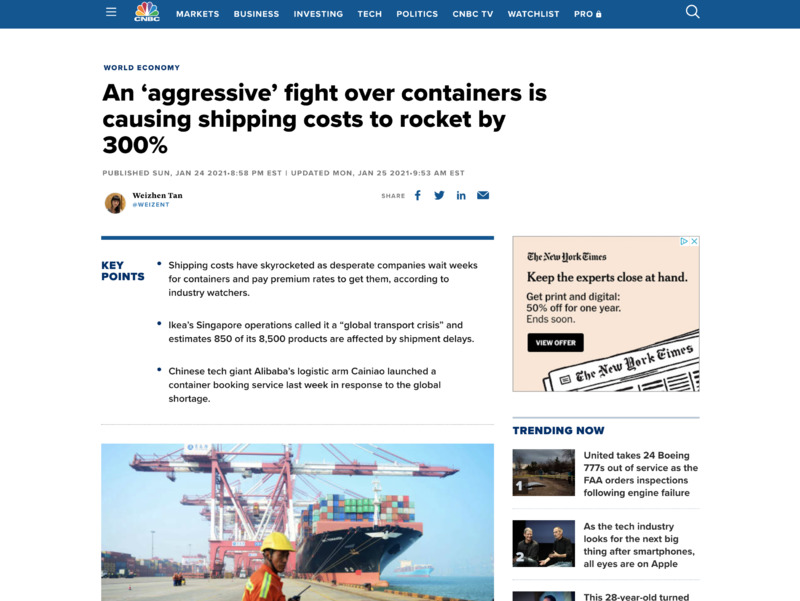
2021-01-24
Container Crisis Brought About By COVID
The US imports 3 containers of Chinese goods
whilst exporting only 1 container of goods
-
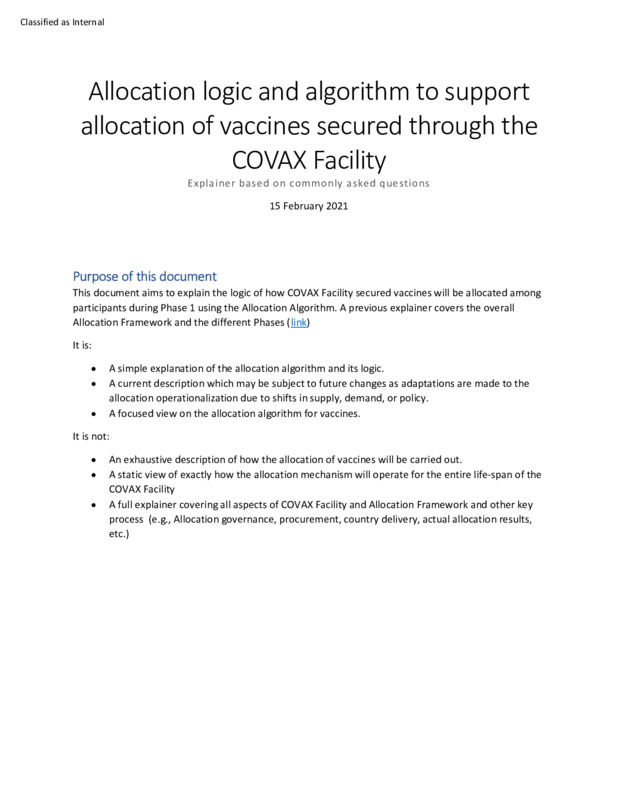
2021-02-15
COVAX - The initiative to help supply vaccines to poor countries FEB 15 publication.
-
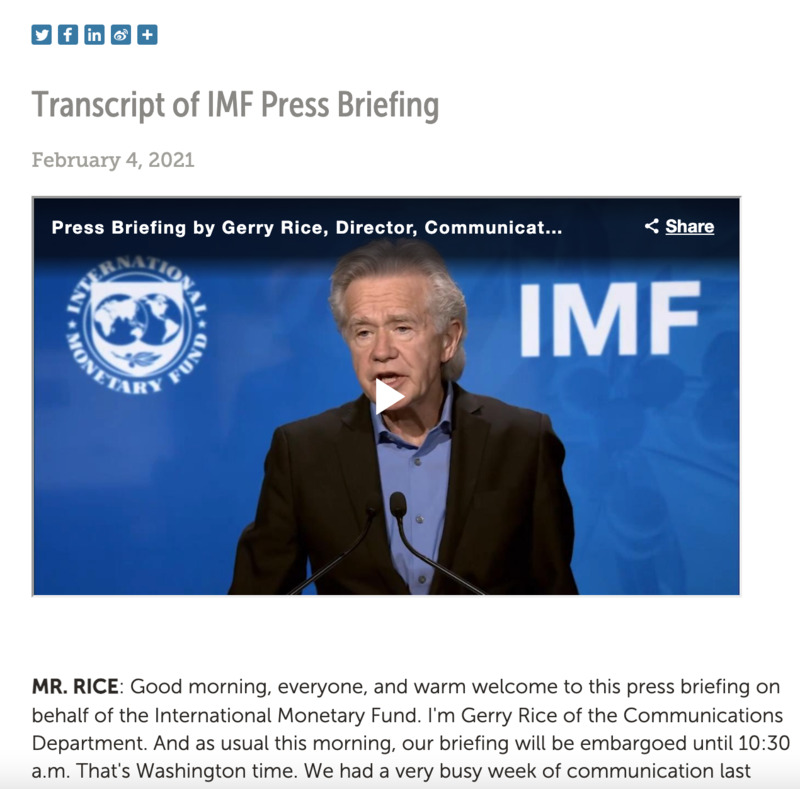
2021-02-04
Questions Reporter Asked IMF Gerry Rice [ Director, Communications Department, IMF ]
concerning Myanmar COVID Relief Money
QUESTIONER: In terms of Myanmar, recent developments in Myanmar. It seems that quite recently, just before the coup, that the IMF had given some $350 million and dedicated it toward it. I'm wondering what are your thoughts? First of all, what are the IMF's thoughts, obviously, on the coup? But also generally, how did the IMF react when there's a change of government in this way right after they've given money? Is there any -- how can you assure that the money goes, you know, for the intended purposes? That it doesn't actually support a now more military government? That's my question for today.
MR. RICE: Thank you very much for that. We are, of course, very concerned about the impact of recent events and what they could have on the people of Myanmar, and we're watching it very closely, of course, like the rest of the world. Just to remind that, of course, Myanmar faced large economic and social costs as a result of the pandemic, and the IMF resources, our support was to help the people of Myanmar to meet these urgent humanitarian needs. That was the whole purpose.
Again, just to set in context, the approval of this supports was back in January by our board and followed all standard procures for this kind of emergency financing. The same as we have done for another 84 countries in this crisis, and standard safeguards in place regarding the resources, including the repayment schedule. And as I think you know, the IMF's record over 75 years on repayment and safeguarding of IMF resources is very clear. In terms of the status of our engagement, we have had no communication at this point with the new regime, and that's about as much as I have at the moment on Myanmar.
QUESTIONER: So I had a question to follow up on Myanmar. I'm just wondering, on what happens [next]? Do you have to wait until whatever government emerges to reach out to the IMF to see if there's going to be even a relationship with the IMF going forward? And, you know, some people that I've spoken with are suggesting that well, this is kind of a pitfall of these rapid disbursing instruments that have been used. The money goes out very quickly all at once with no or very few conditions attached to it. Is there any thought to changing that at this stage and, you know, just wondering what next steps are on this? Is it just waiting till the smoke clears to decide how we engage? Also, the military generals that were appointed, a new central bank chief who was the same guy that ran the central bank when they were in power. Is there some concern that the central bank will lose its independence?
MR. RICE: Just on your last point, of course, the independence of central banks is one of the fundamental principles that the IMF believes in and supports so, you know, just to make that very clear. On your other points, clearly the situation is unfolding. In terms of recognition of the government as in other cases, we are guided by the international community, guided by the membership in terms of recognition of the government. So again, the situation is unfolding there but that's what guides us in terms of our relationship with countries.
You know, what I'd say on how the resources that we approved back in January how they are used, clearly again, as I said, these resources were for a clear purpose, the crisis, the pandemic, the helping with the humanitarian needs there. And, of course, it would be in the interest of the government and certainly the people of Myanmar that those funds are indeed used accordingly. Under the arrangement that was agreed with the previous former government, there was indeed safeguards regarding how the funds would be used as is the case with all of our emergency financing. I've talked about it here before. That included audit and, you know, transparency of how the resources are used. And again, this is true for all of the emergency financing. So while there are few conditions, as you rightly say, there are safeguard provisions and it would be our expectation that, you know, regardless of the future that these commitments would be maintained. Because those resources need to go to support the people and especially vulnerable groups.
So you asked finally where we’re thinking of changing. You know, again, we've been using these emergency financing instruments in 85 countries so far. I think they have been a huge help and assistance in the crisis especially to the poorest countries, to low income countries. And I think one of the reasons that they've been so effective and we've been able to get the support so quickly is the, you know, the conditions are relatively few. However, and again I stress, the safeguards and the governance of those resources is something that we give high priority to and each one of those has a set of safeguards. Whether it's audit or publishing of procurement contracts, you know, there's a whole series of governance related provisions that we have attached to these loans. These are very important and we're confident that the resources will be well used and for the purpose that they were intended in these emergency financing loans.
-
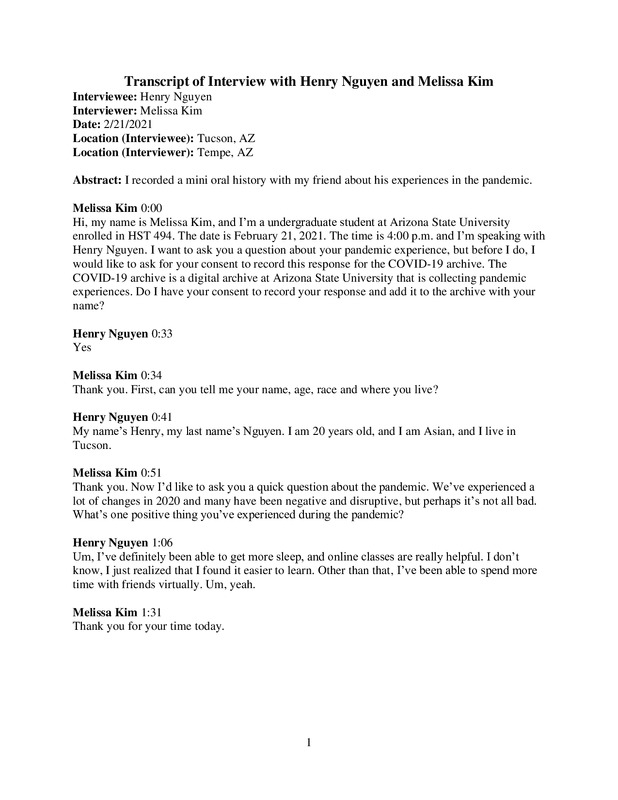
02/21/2021
I recorded a mini oral history with my friend about his experiences in the pandemic.
-
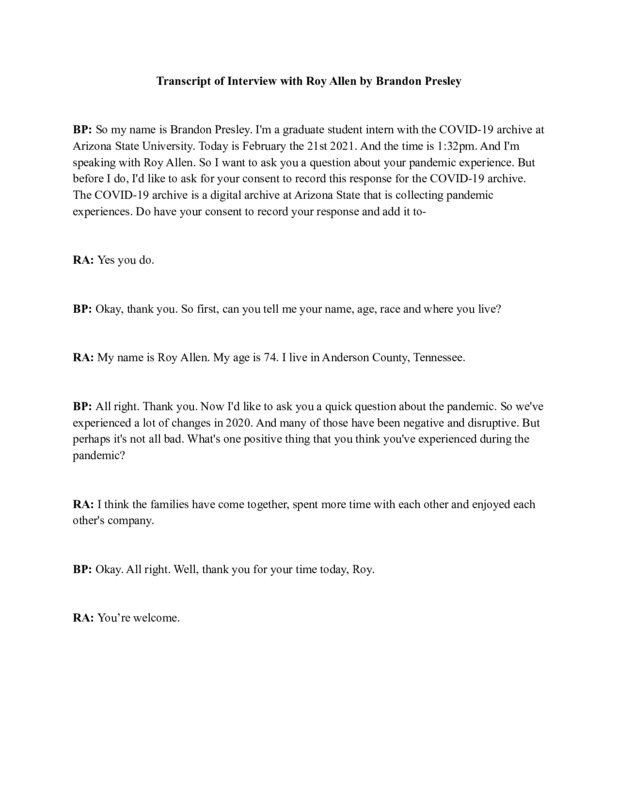
2021-02-21
This is an oral history with my grandfather, Roy. Roy believes that the silver lining from the pandemic was how much closer families are today than they were before.
-
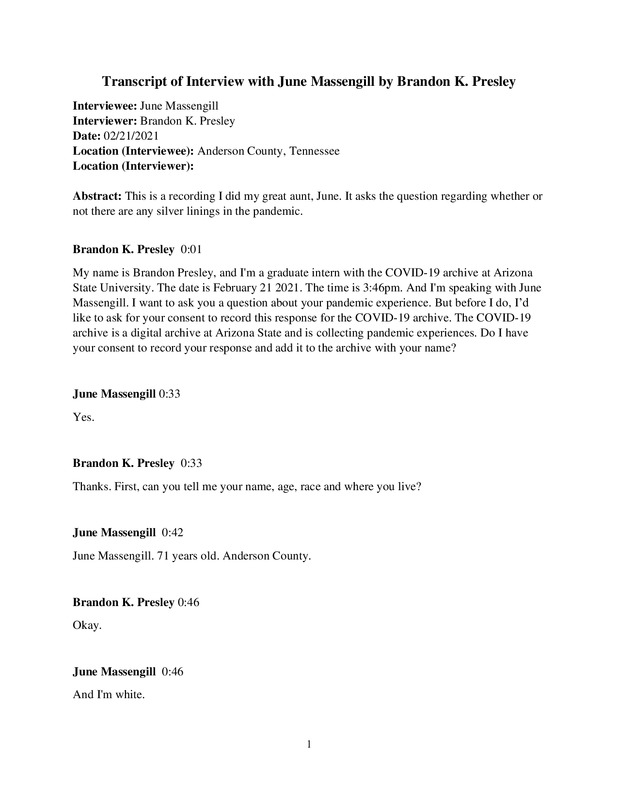
02/21/2021
This is a recording I did my great aunt, June. It asks the question regarding whether or not there are any silver linings in the pandemic.
-
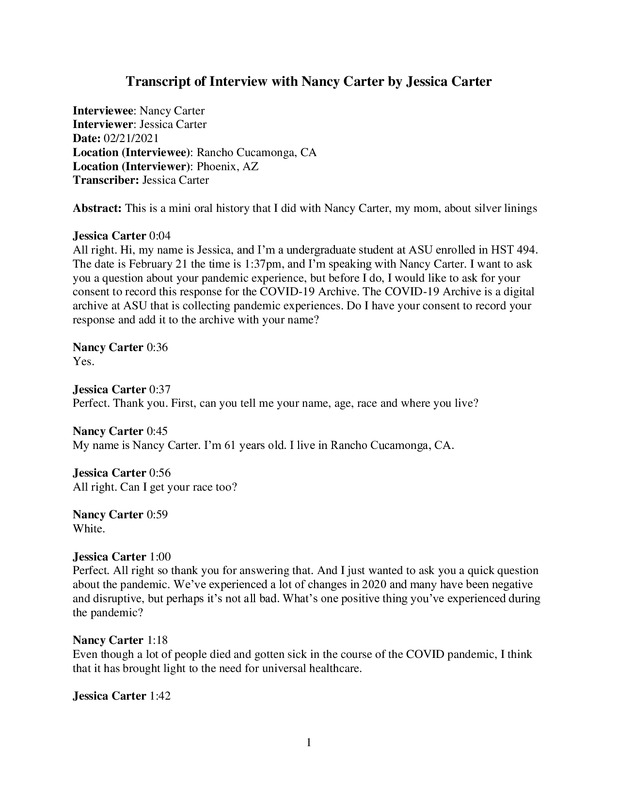
02/21/2021
This is a mini oral history that I did with Nancy Carter, my mom, about silver linings
-
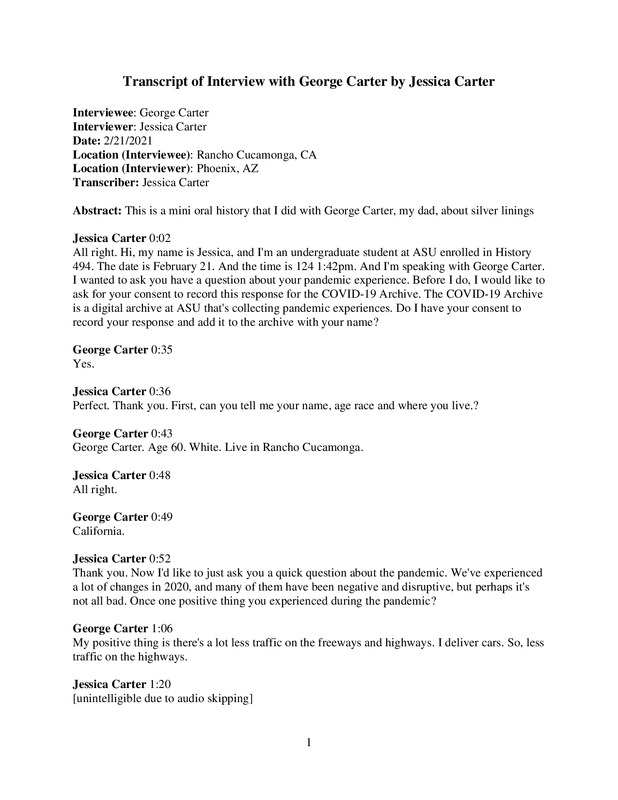
02/21/2021
This is a mini oral history that I did with George Carter, my dad, about silver linings
-
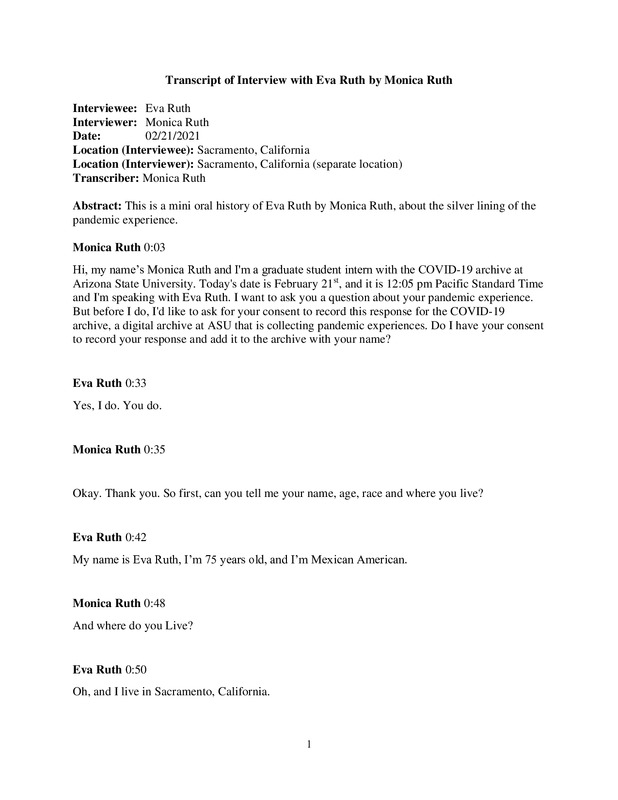
02/21/2021
This is a mini oral history of Eva Ruth by Monica Ruth, about the silver lining of the pandemic experience.
-
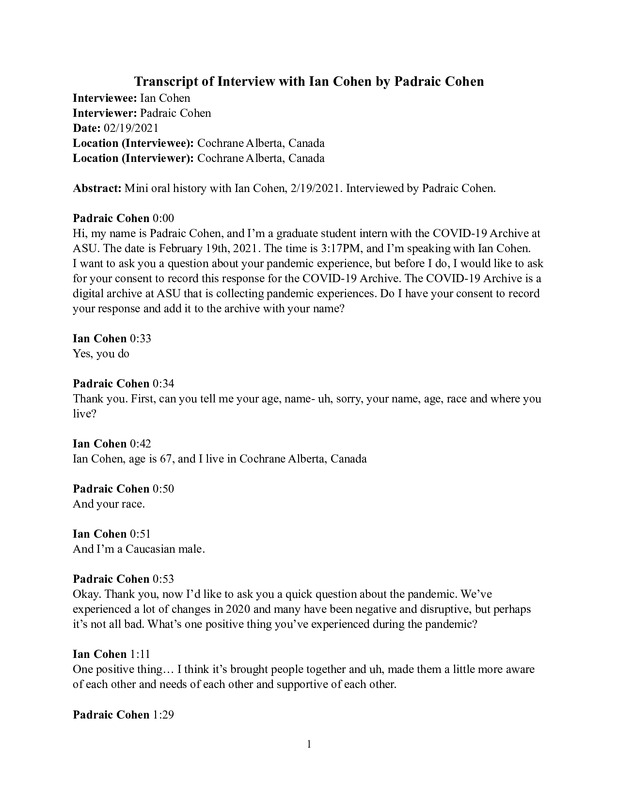
02/19/2021
Mini oral history with Ian Cohen, 2/19/2021.
Interviewed by Padraic Cohen
-
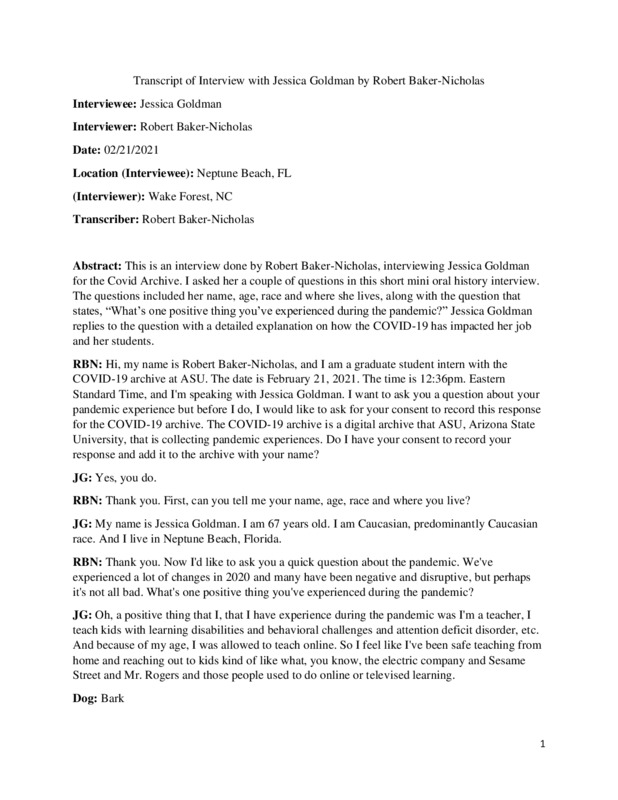
2021-02-21
This is an interview done by Robert Baker-Nicholas, interviewing Jessica Goldman for the Covid Archive. I asked her a couple of questions in this short mini oral history interview. The questions included her name, age, race and where she lives, along with the question that states, “What’s one positive thing you’ve experienced during the pandemic?” Jessica Goldman replies to the question with a detailed explanation of how the COVID-19 has impacted her job and her students.
-
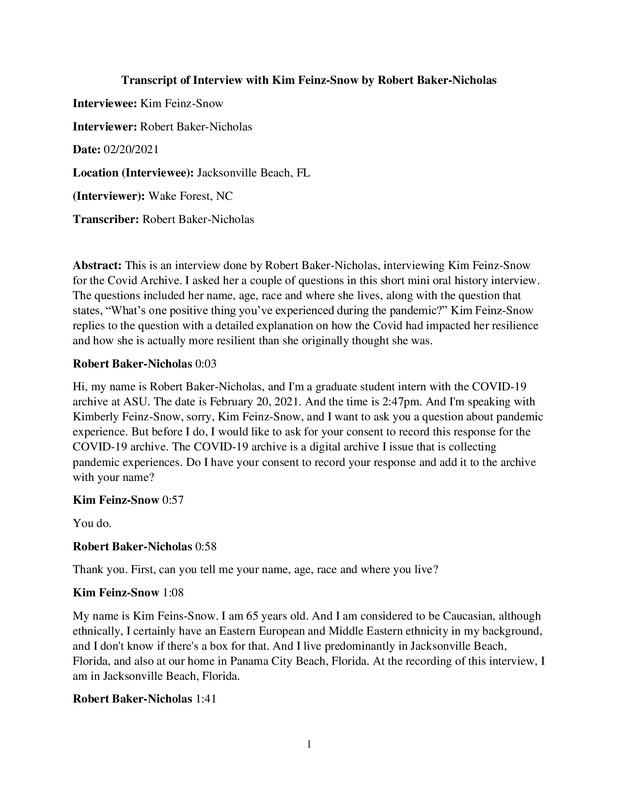
02/21/2021
This is an interview done by Robert Baker-Nicholas, interviewing Kim Feinz-Snow for the Covid Archive. I asked her a couple of questions in this short mini oral history interview. The questions included her name, age, race and where she lives, along with the question that states, “What’s one positive thing you’ve experienced during the pandemic?” Kim Feinz-Snow replies to the question with a detailed explanation on how the Covid had impacted her resilience and how she is actually more resilient than she originally thought she was.
-
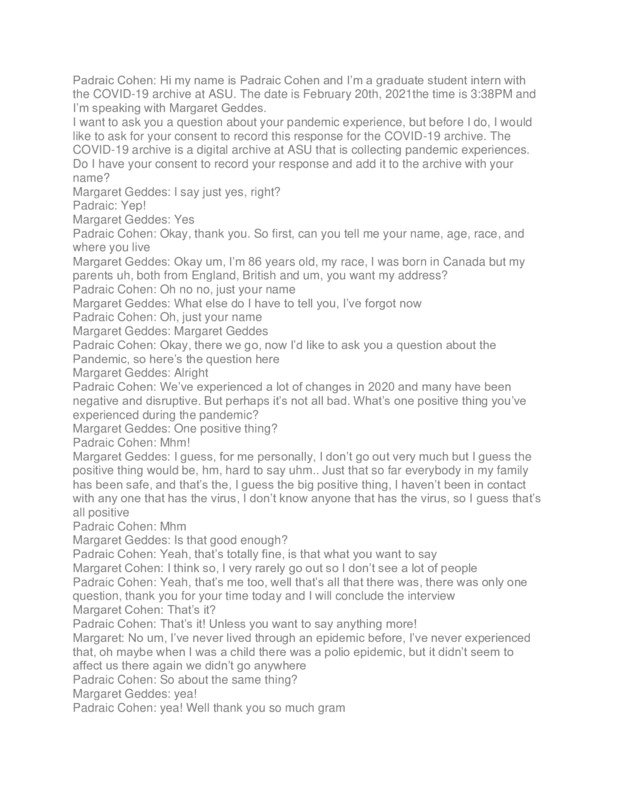
2021-02-20T15:38
Mini oral history with Margaret Geddes, 2/20/2021
Interviewed by Padraic Cohen
-
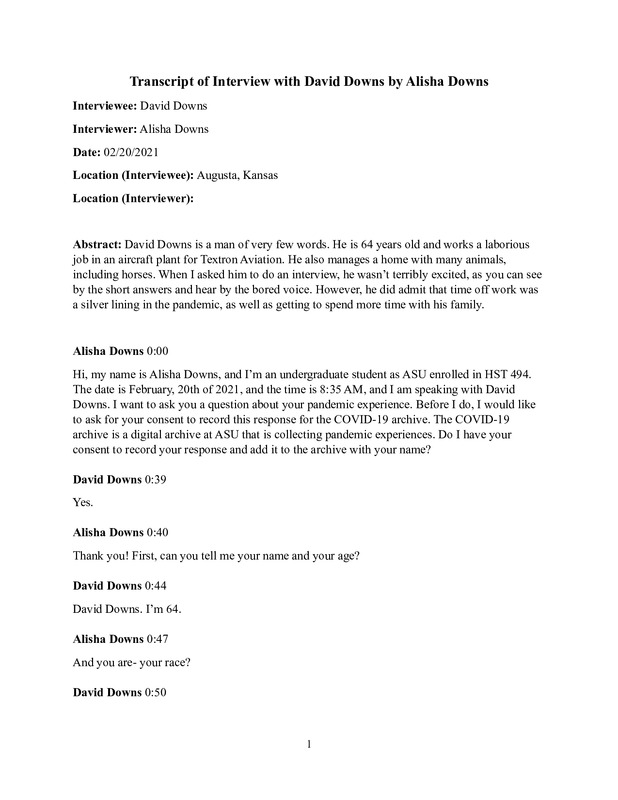
02/20/2021
David Downs is a man of very few words. He is 64 years old and works a laborious job in an aircraft plant for Textron Aviation. He also manages a home with many animals, including horses. When I asked him to do an interview, he wasn’t terribly excited, as you can see by the short answers and hear by the bored voice. However, he did admit that time off work was a silver lining in the pandemic, as well as getting to spend more time with his family.
 2021-02-27
2021-02-27 2021-02-16
2021-02-16 2021-02-22
2021-02-22 2020-09-10
2020-09-10 2020-12-13
2020-12-13 2021-01-26
2021-01-26 2021-02-26
2021-02-26 2021-02-26
2021-02-26 2021-02-26
2021-02-26 2021-02-26
2021-02-26 02/23/2021
02/23/2021 2021-02-25
2021-02-25 2021-03-01
2021-03-01 2021-02-24
2021-02-24 2021-02-24
2021-02-24 2021-02-24
2021-02-24 2021-02-18
2021-02-18 2021-02-19
2021-02-19 02/23/2021
02/23/2021 2020-02-23
2020-02-23 2021-02-22
2021-02-22 2020-04-04
2020-04-04 02/22/2021
02/22/2021 2021-02-22
2021-02-22 02/22/2021
02/22/2021 2021-02-22
2021-02-22 2021-02-22
2021-02-22 2021-02-22
2021-02-22 2021-02-22
2021-02-22 2021-02-20
2021-02-20 2021-02-19
2021-02-19 02/21/2021
02/21/2021 02/21/2021
02/21/2021 2021-02-21T14:40
2021-02-21T14:40 02/21/2021
02/21/2021 02/21/2021
02/21/2021 2021-01-24
2021-01-24 2021-02-15
2021-02-15 2021-02-04
2021-02-04 02/21/2021
02/21/2021 2021-02-21
2021-02-21 02/21/2021
02/21/2021 02/21/2021
02/21/2021 02/21/2021
02/21/2021 02/21/2021
02/21/2021 02/19/2021
02/19/2021 2021-02-21
2021-02-21 02/21/2021
02/21/2021 2021-02-20T15:38
2021-02-20T15:38 02/20/2021
02/20/2021